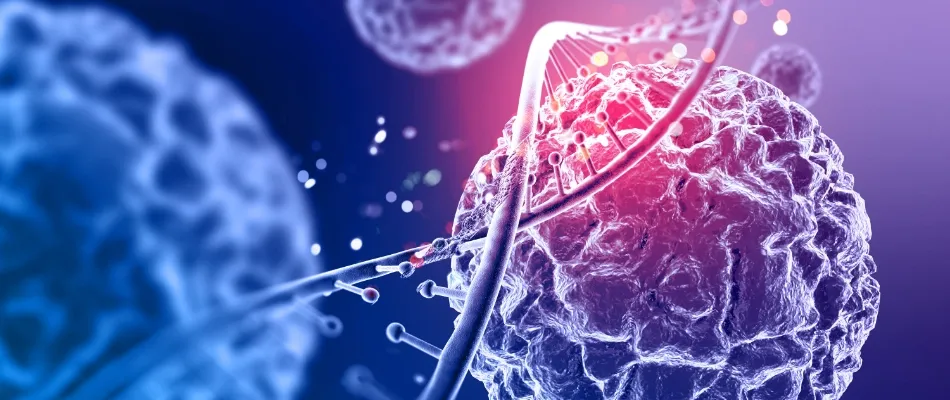- Chemotherapy
- Immunotherapy
- Targeted Therapy
- Palliative Care
- Day Care Centre
- Paxman Scalp Cooling
- Bone Marrow Evaluation
- Lymphapress
- Genetic Counselling
- Home Healthcare
- Clinical Research
- 2nd Opinion Clinic
- Psycho-Oncology
- Multi-Disciplinary Tumor Board-MDT
- Onco Nutrition
- Onco Physiotherapy
- Medical Tourism
- Yoga & Wellbeing
- Patient Support Group
- Crowd Funding


Immunotherapy
Immunotherapy, a wide term for a class of drugs used to treat cancer, activates the immune system to
fight cancer cells. Healthy cells naturally die off, however, cancer cells do not. They proliferate
like an untamed copy machine that won’t quit.
The immune system, which protects the body from infections and disease, is unable to identify these
abnormal cells because they frequently alter or mutate. In order for the immune system to detect and
destroy these changed cells, drugs employed in cancer immunotherapy are designed to alert it to
their presence. Immunotherapy is a treatment option for several types of cancer. It may be used
alone or in conjunction with other cancer treatments such as chemotherapy.
Subtypes of therapy
- Checkpoint inhibitors- The flow of signals to T-cells is controlled by checkpoint proteins and other proteins, which instruct the cells when to switch on and off. To eliminate malignant cells, T cells activate. They switch off to protect healthy cells.
- Adoptive cell therapy (T-cell transfer therapy)- Your T lymphocytes, or T-cells, are modified during chimeric antigen receptor (CAR) T-cell treatment to make them more effective cancer-fighting units.
- Cancer vaccines- Your body is protected against several infections by vaccinations. The vaccine concept is being utilized for treating some cancers like prostate cancer.
- Immune system modulators- Biologic response modifiers, commonly known as immunomodulatory medicines, are pharmaceuticals that modulate your immune system to destroy some specific cells.
Benefits of Immunotherapy
- In comparison to chemotherapy or surgery, immunotherapies are generally still utilized for the treatment of cancer less frequently. But for some cancer types, these medications are starting to play a key role in therapy.
- Immunotherapies have the potential to be both more effective and less dangerous than other types of cancer treatment because they employ the body’s innate ability to fight the tumor.
Downside of Immunotherapy
- It may take more than a few cycles to see a response with immunotherapy
- The side effects may sometimes be serious due to immune activation against normal cells of the body
Immunotherapy administration:
Different immunotherapy treatments can be administered in various ways. These consist of:
- Intravenous (IV)- Immunotherapy is delivered straight into a vein.
- Oral- You must ingest the pills or capsules.
- Cream or ointment- You apply the immunotherapy cream directly to your skin after purchasing it. Skin cancer that has just started can be treated with this kind of immunotherapy.
- Intravesical- The immunotherapy is infused into the bladder right away.
Side effects of Immunotherapy
The care team will offer integrated care services throughout your treatment, including pain management, naturopathic support, nutritional assistance, oncology rehabilitation, behavioral health support, and spiritual support. During immunotherapy, these treatments may lessen side effects and enhance your general quality of life.
Immunotherapy can cause side effects due to immune activation against the normal cells of the body which could be as follows:
- Fatigue
- vomiting or diarrhea
- oral sores
- Cough and breathlessness
- elevated blood pressure
- fluid accumulation, typically in the legs
- cold or fever
- Headaches
- Itching or rashes
- High blood sugar
Immunotherapy medication:
The PD-1 and CTLA-4 receptors are the targets of current checkpoint inhibitor medications. Checkpoint inhibitors frequently used are:
- (Yervoy®) Ipilimumab
- Keytruda® (pembrolizumab)
- Opdivo® (nivolumab)
- Tecentriq® (atezolizumab)
The development of new immunotherapy medicines is ongoing.
Post Immunotherapy care
Getting care is crucial once cancer therapy is over. Your medical team can assist you in managing long-term side effects and keeping an eye out for emerging ones. The term for this is follow-up care. Regular physical exams, diagnostic procedures, or a combination of both may be part of your follow-up care.
Do’s & Don’ts during treatments
Do’s
- Rest Well.
- Eat wisely.
- Stay Active
- Reduce stress.
Don’ts
- Skip big meals
- Smoke or drink
FAQ’s
- Can cancer be cured by immunotherapy?
No, however, cancer can be controlled with immunotherapy, extending life. It sometimes inhibits the growth of cancer. - What advantages does immunotherapy have?
For cancers that have not responded to conventional therapy or that have returned after conventional therapy, immunotherapy may be a useful treatment. - What are the dangers or issues?
Not all cancers respond well to immunotherapy, and not everyone who receives it will have success.
Book Your Appointment








